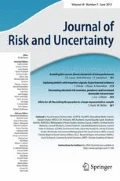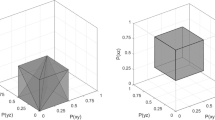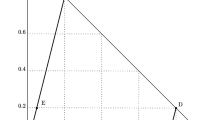Abstract
The metaphor of gambling has had great influence on the topic of choice under uncertainty. However, in many real-world situations, people must make choices when they lack information about the relevant economic features of gambles, i.e., probabilities and outcomes. We refer to this as choice under ignorance as opposed to choice under risk or uncertainty. We propose that people handle these decisions by generating rationales or arguments that allow them to resolve the choice conflict. Moreover, these rationales often do not correspond to principles derived from the cost-benefit framework of economic models. These ideas are explored in two experiments in which subjects simulated the purchase of warranties for consumer durables. Our principal findings are, first, that observable behaviors differ between situations where subjects do and do not have information on probabilities and outcomes. Second, economic cost-benefit models did not yield good descriptions of our subjects' decisions. Third, the nature of arguments used, and thus the processes invoked, differed as a function of the information available to subjects. And fourth, subjects' arguments indicated two types of strategies for reaching decisions. In one, they processed the particular characteristics of each choice option; in the other, they invoked a “meta-rule” or principle that resolved the choice conflict and was insensitive to the particular features of different options. Finally, we discuss the implications of our results. This includes questioning the appropriateness of using the gamble as a metaphor for choice in future research.
Similar content being viewed by others
References
Arrow, K. J., and L. Hurwicz. (1972). “An Optimality Criterion for Decision Making Under Ignorance.” In C. F. Carter and J. L. Ford (eds.),Uncertainty and Expectations in Economics. Oxford: Basil Blackwell & Mott Ltd.
Camerer, C. F., and M. Weber. (1992). “Recent Developments in Modeling Preferences: Uncertainty and Ambiguity,”Journal of Risk and Uncertainty 5, 325–370.
Cohen, M., and J.-Y. Jaffray. (1980). “Rational Behavior under Complete Ignorance,”Econometrica 48,(5), 1281–1299.
Coombs, C. H., R. M. Dawes, and A. Tversky. (1970).Mathematical Psychology: An Elementary Introduction. Englewood Cliffs, NJ: Prentice-Hall.
Curley, S. P., and J. F. Yates. (1985). “The Center and the Range of the Probability Interval as Factors Affecting Ambiguity Preferences,”Organizational Behavior and Human Decision Processes 36, 273–287.
Einhorn, H. J., and R. M. Hogarth. (1981). “Behavioral Decision Theory: Processes of Judgment and Choice,”Annual Review of Psychology 32, 53–88.
Einhorn, H. J., and R. M. Hogarth. (1986). “Decision Making under Ambiguity,”Journal of Business 59(4), Part 2, S225-S250.
Fiske, S. T., and M. A. Pavelchak. (1986). “Category-based versus Piecemeal-based Affective Responses: Developments in Schematriggered Affect.” In R. M. Sorrentino and E. T. Higgins (eds.),Handbook of Motivation and Cognition: Foundations of Social Behavior. New York: Guilford Press, pp. 167–203.
Goldstein, W. M., and E. U. Weber (forthcoming). “The Use of Knowledge in Decision Making: Indications and Implications of Domain Specificity.” In J. R. Busemeyer, R. Hastie, and D. L. Medin (eds.),Decision Making from the Perspective of Cognitive Psychology. New York: Academic Press.
Heath, C., and A. Tversky. (1991). “Preference and Belief: Ambiguity and Competence in Choice under Uncertainty,Journal of Risk and Uncertainty 4, 5–28.
Hogarth, R. M., and H. C. Kunreuther. (1989). “Risk, Ambiguity, and Insurance,”Journal of Risk and Uncertainty 2, 5–35.
Kahneman D., and A. Tversky. (1979). “Prospect Theory: An Analysis of Decision under Risk,”Econometrica 47, 263–291.
Kleindorfer, P. R., H. C. Kunreuther, and P. J. H. Schoemaker. (1993).Decision Sciences: An Integrative Perspective. New York: Cambridge University Press.
Kunreuther, H., J. Meszaros, R. M. Hogarth and M. Spranca. (forthcoming). “Ambiguity and Underwriter Decision Processes,”Journal of Economic Behavior and Organization.
Montgomery, H. (1983). “Decision Rules and the Search for a Dominance Structure: Towards a Process Model of Decision Making.” In P. C. Humphreys et al. (eds.),Analyzing and Aiding Decision Processes. Amsterdam: North-Holland, pp. 343–369.
Payne, J. W., J. R. Bettman, and E. J. Johnson. (1992). “Behavioral Decision Research: A Constructive Process Perspective,”Annual Review of Psychology 43, 87–131.
Shafir, E., D. N. Osherson, and E. E. Smith. (1989). “An Advantage Model of Choice,”Journal of Behavioral Decision Making, 2(1), 1–23.
Shafir, E., Simonson, I., and Tversky, A. (1993). “Reason-based Choice,”Cognition 49, 11–36.
Simonson, I. (1989). “Choice Based on Reasons: The Case of Attraction and Compromise Effects,”Journal of Consumer Research 16, 158–174.
Slovic, P. (1975). “Choice between Equally-valued Alternatives,”Journal of Experimental Pyschology: Human Perception and Performance 1(3), 280–287.
Slovic, P., and S. Lichtenstein. (1971). “Comparison of Bayesian and Regression Approaches to the Study of Information Processing in Judgment,”Organizational Behavior and Human Performance 6, 649–744.
Author information
Authors and Affiliations
Rights and permissions
About this article
Cite this article
Hogarth, R.M., Kunreuther, H. Decision making under ignorance: Arguing with yourself. J Risk Uncertainty 10, 15–36 (1995). https://doi.org/10.1007/BF01211526
Issue Date:
DOI: https://doi.org/10.1007/BF01211526




